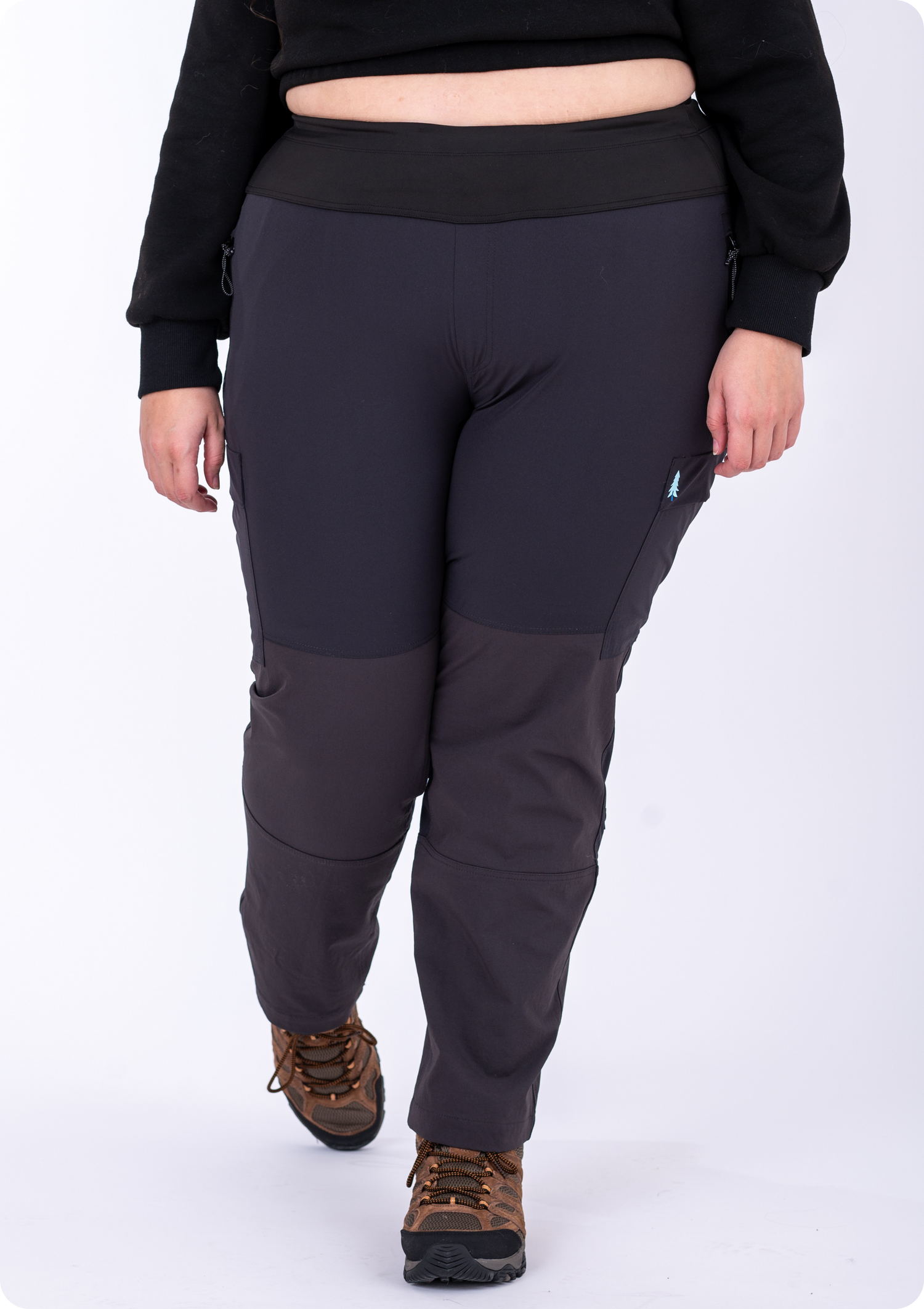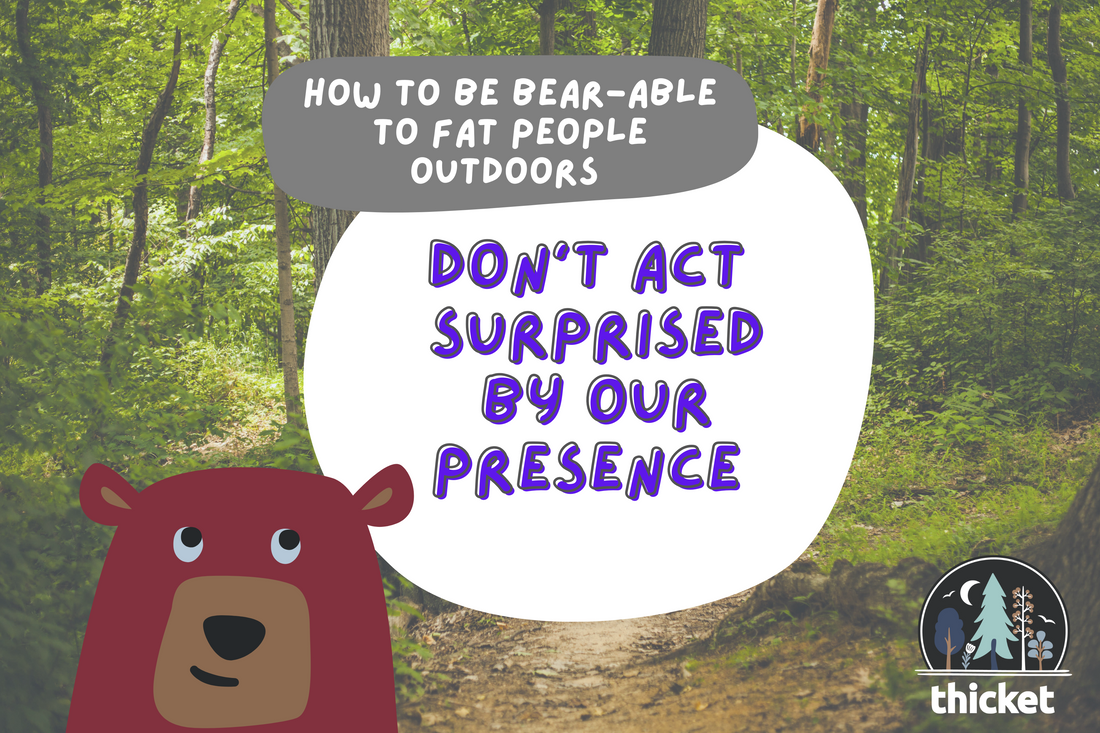We have the right to make a safe space by speaking up or stepping back.
In a society where anti-fat bias has been so widely accepted for generations, it can seem daunting to know when to say something or when to stay quiet when anti-fat microaggressions are all around us.
Before we jump into some tips on how to deal with these unbearable comments, remarks, questions, or actions, let’s break down what the heck a microaggression is in the first place.
Microaggressions
Microaggressions are the everyday slights, insults, putdowns, invalidations, and offensive behaviors that people experience in daily interactions with generally well-intentioned individuals who may be unaware that they have engaged in demeaning ways. (UNC School of Medicine)
In our first Fat Unbearable Blog, we included some common microaggressions that fat outdoorsy folx experience. Some of the comments we received were to simply ignore the cruel, rude and douchey things said and done to fat bodies in outdoor spaces. Here is the problem with ignoring microaggressions. There is a real impact when someone experiences these constant slights, insults, and expressed biases
Common effects of long-term microaggressions include loss of self-esteem, feelings of exhaustion, inability to thrive in an environment, mistrust of peers, as well as increased stress. (Univ. of Edinburgh)
Also, they just really suck especially when you are just trying to experience joy outdoors. Well my fellow fat beautiful friends, we get to choose when, how, and if we respond* to these microaggressions.
*You are inherently worthy and have the right to establish a safe space by speaking up or stepping back. Choosing not to address microaggressions for the sake of your safety or to avoid emotional fuckery is also a valid decision.
Responses
Below is a chart of different ways we find useful to respond to different types of microaggressions. For our straight-sized allies who are reading this, we have also included some responses for you to help make spaces more inclusive, safe, and comfortable for fat people.
|
Type of Microaggression |
Fat Person Response |
Ally Response |
|
Fat Joke |
“I am really not the audience for that joke.” “Can you explain to me why that joke is funny?” “Ew.” (and then walk away) |
“I am really not the audience for that joke.” “Can you explain to me why that joke is funny?” “Ew.” (and then walk away) |
|
Unsolicited weight-loss, food, exercise, or health advice to a fat person. |
“My health is between me and my primary care physician.” “I prefer not to talk about my body/food restriction” |
“I noticed that you are giving unsolicited health/food/body advice. I used to do/say that too, but then I learned that that can be really harmful.” “Giving unsolicited advice is so cringe.” |
|
Subtle derogatory or patronizing comments towards a fat person. |
“Could you say more about what you mean by that.” “When you __________ , that is actually a harmful thing to say because ______.” |
“I heard that comment and it didn’t feel right.” “When you __________ , that is actually a harmful thing to say because ______.” “Don’t be such a twat waffle.” |
|
Complaining about looking fat or making negative comments about other peoples’ size to a fat person. |
“I am really not the audience for this conversation.” “What’s wrong with being fat?” “Your body is your own business, but when you say negative things about fatness, you are actually insulting my body.” |
“Your weight is the least interesting thing about you.” “This topic is hard for a lot of people, so I try not to talk about it.” (Aubrey Gordon) |
|
Non-Verbal Microaggressions to a fat person ie. straight-sized people staring at us when we are doing physical activity, eat, and take up space in thin dominated places. |
Non-Verbal microaggressions are difficult to navigate. The aggressors can be unpredictable and will most likely deny the aggression if confronted. Allies can be very helpful in these situations. If you are comfortable with it, stare back at them until they stop or give them a wave to get them to acknowledge that you are a human too. |
“I noticed that you changed seats when that person sat near us. What is going on?” “I noticed you staring at the person back there. What was that about?” |
|
You are inherently worthy and have the right to establish a safe space by speaking up or stepping back. Choosing not to address microaggressions for the sake of your safety or to avoid emotional strain is a valid decision. |
||
As per all of our tips and recommendations, these are things that have worked for us in many situations and sometimes they frankly don’t because haters gonna hate. You do what makes you feel best and safe. We love you!
In Summary
To summarize, microaggressions suck and we get to choose how we make our space safe by speaking up or stepping out. When experiencing a lot of microaggressions, it helps to have a supportive community with folx with shared lived experience/intersections.
Look on facebook or instagram for fat, plus-size, and weight neutral groups in your area. Be sure to check that the rules include anti-fat bias language.
Articles:
https://www.ravishly.com/2017/03/09/thinspreading-do-thin-people-take-more-space-fat-people
Videos:
Microaggressions are like Mosquito Bites
Books:
Aubrey Gordon: You Just Need to Lose Weight and 19 Other Myths About Fat People


